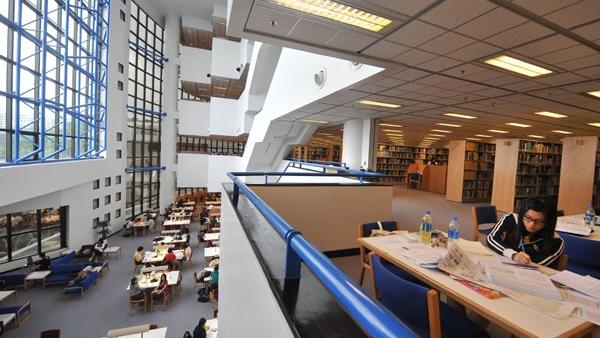 This undated picture shows a library in the Hong Kong University of Science and Technology. (PROVIDED TO CHINA DAILY)
This undated picture shows a library in the Hong Kong University of Science and Technology. (PROVIDED TO CHINA DAILY)
The Hong Kong University of Science and Technology (HKUST) has proposed establishing the city’s third medical school.
Confirming the plan, the university on Thursday said the demand for healthcare and medical services is increasingly urgent because of the aging population.
Health technology, biomedicine, and translational medicine are among the six key frontier scientific areas for HKUST.
The university said it will reveal details of its proposal in the future.
For every 1,000 people, there were 2.1 doctors in the city, which was less than the average figure of 3.6 doctors per 1,000 people, for members of the Organization for Economic Co-operation and Development
The city currently has two medical schools hosted by the Chinese University of Hong Kong and the University of Hong Kong, which provide a total 590 places for medical programs in the 2022-23 academic year. Normally, a medical degree take six years to complete.
ALSO READ: HKUST to launch Hong Kong's first university satellite
In 2021, the city had 15,546 registered doctors, with 43 percent of them working in hospitals and institutions run by the city’s Hospital Authority. However, the city’s public hospitals take care of about 90 percent of the city’s patients requiring medical treatment.
The already-strained public hospitals are also suffering from an increasing attrition rate of full-time employees. For 2020-2021 to 2022-2023, the attrition rate of doctors was up from 4.3 percent to 7.6 percent, which means over 480 full-time doctors left the public system.
For every 1,000 people, there were 2.1 doctors in the city, which was less than the average figure of 3.6 doctors per 1,000 people, for members of the Organization for Economic Co-operation and Development.
The medical-school plan was first revealed by lawmaker Edward Leung Hei, after his meeting with HKUST President Nancy Ip Yuk-yu on Wednesday.
ALSO READ: HKUST to launch world's first virtual campus
Leung said the new medical school would focus more on scientific research and plans to recruit 50 medical students every year in the first phase. With gradual development, it is hoped the university would train 200 medical students yearly. Leung said the university also proposed allowing students to study medical courses as their minor subject, which means nonmedical bachelor’s degree-holders can also apply to the medical school.
Leung also said the university has already submitted to the government the plan, which involves a piece of land that’s over 12 hectares.
Secretary for Education Christine Choi Yuk-lin said that the bureau has always encouraged institutions to develop different courses, in response to the development needs of Hong Kong and the city’s eight roles listed under the country’s 14th Five-Year Plan (2021-25).
Choi said the bureau will consider the university’s proposal, if submitted within its three-year plan, together with the University Grants Committee, the statutory advisory body on policies and funding of UGC-funded universities.
READ MORE: HKUST, Aussie uni find T cells effective in tackling Omicron
Lawmaker Lam Tzit-yuen, who is also a surgeon, believes that establishing a scientific research-centered medical school would have advantages. He pointed out that the quotas of medical school students at the University of Hong Kong and the Chinese University of Hong Kong already have no room to increase. As it would take time for HKUST to build a medical school, the move would not be able to relieve the doctor shortage in the short term, Lam said.


